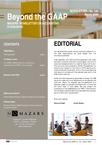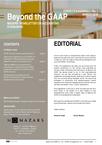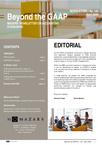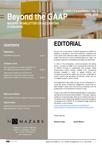
Accounting impacts of the COVID-19 crisis on the IFRS financial statements
In this unprecedented situation, this newsletter will present Mazars’ preliminary views on topics that are currently being discussed within the accounting profession and that will impact IFRS financial statements of the companies.
Implementing the IFRS 9 impairment model in the context of the COVID-19 crisis
In this context of high uncertainty and increasing short-term economic challenges for companies, questions arise as to how to implement the IFRS 9 expected credit losses impairment model. Market regulators, banking authorities and regulators, and accounting standard-setters have been working together to develop guidance to help companies implement IFRS 9 in this unprecedented situation.
Given the current COVID-19 outbreak and its economic impact on financial instruments, some practices and models that were developed in a very different context may no longer be useful. Companies must use their judgement to determine whether any adjustments to their methodology are required.
In particular, companies must ensure that the impairment policies used to take account of the impacts of the COVID-19 crisis (whether on an individual or a collective basis) do not result in financial assets being automatically transferred to Bucket 2 when there is no economic justification for this. These policies must also allow companies to take account of the impacts of support measures implemented by public authorities.
Rent concessions as a result of COVID-19: the IASB proposes to amend IFRS 16
The COVID-19 health crisis has led, or will lead, many lessors to grant rent concessions to their lessees. These concessions may in some cases be encouraged or even required by governments. The analysis required in order to assess whether a change in rental payments represents a contract modification appears particularly complex and would be a major challenge for stakeholders during the COVID-19 pandemic.
Therefore, in the Exposure Draft published on April 24th, the IASB proposes to amend IFRS 16 to give lessees, and only lessees, the option to elect not to assess whether a COVID-19-related rent concession is a lease modification. Lessors would be excluded from the scope of this practical expedient and the IASB does not currently intend to amend the standard as it applies to them. To accelerate the publication of this amendment, the comments period runs for just 14 days. Comments were therefore expected by 8 May.
The proposed changes would only apply to: rent concessions resulting directly from the COVID-19 pandemic, and under certain conditions, including a time-frame and occurrence within a limited period (only the reduction of rents initially due in 2020), to periods beginning on or after 1 June 2020, with the option of early application and would be applicable retrospectively.
Accounting of the state-support measures: which standard should be applied?
Given the wide range of governmental measures, the first challenge for entities receiving State support is to determine which IFRS applies. This is because the measures to date may include the implementation of part-time working measures, “sick leave” for reasons of childcare, etc. Therefore, a case-by-case analysis is necessary to determine which standard applies: IAS 20 on grants, IAS 19 on employee benefits, IFRS 15 on revenue recognition, IAS 12 on income taxes, etc.
In the case of part-time working measures, there has been some doubt as to whether to apply IAS 20 or IAS 19.
- The application of IAS 20: is justified where an entity acts on its own account and receives direct State aid to pay the wages due under an employment contract. In practice, should the State check that the eligibility conditions are met, it is the entity that will have to repay any monies wrongly received. The assistance received from the State will be presented in line with the accounting policy previously adopted (where applicable) for other grants related to income. In practice, this amount can be presented in “other income” or as a deduction from the payroll expenses.
- The application of IAS 19: is justified where the entity pays a replacement income to the employee on behalf of the State, which will then reimburse the money paid. In other words, the business is acting here as an agent for the State and does not receive the grants on its own account. The assistance received must be accounted for as a deduction from payroll expenses.
Presentation of the statement of profit or loss under IAS 1
Some companies, mainly industrial and services ones affected by the COVID-19 crisis have expressed a wish to reflect these impacts separately on the face of the income statement disclosed in line with IAS 1.
European Securities and Markets Authority (“ESMA”)has clarified that the use of alternative performance measures in the financial statementsmust be consistent over time. ESMA recommends a cautious approach where existing measures are adjusted, or new measures introduced with the aim of describing the impact of COVID-19 on financial performance and cash flows.
In practice, ESMA recommends the use of disclosures in the notes, in preference to the amendment of alternative performance measures/sub-totals in the income statement.
Documents
WANT TO KNOW MORE?







